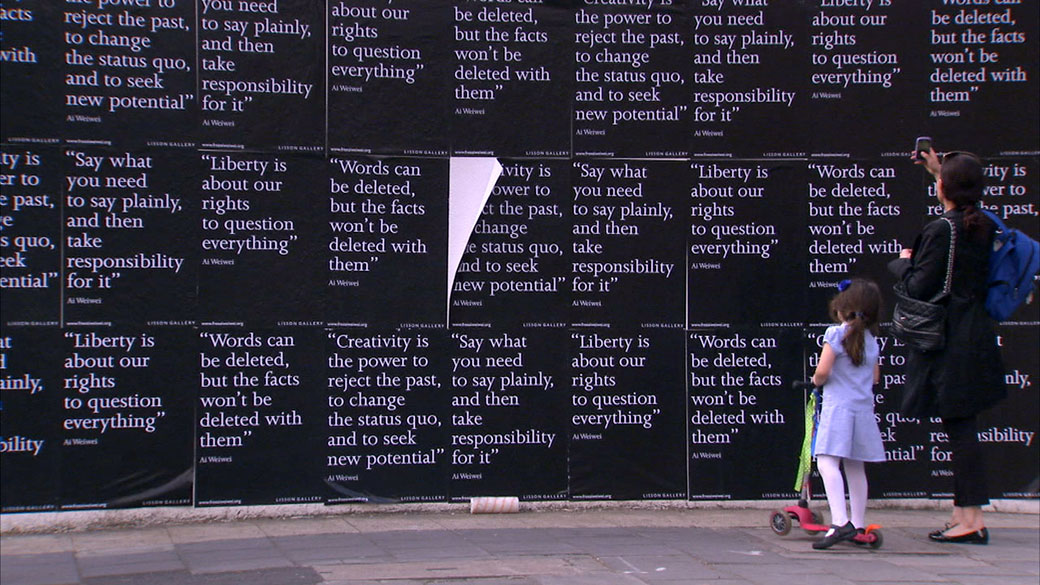
Production still from the Art in the Twenty-First Century Season 6 episode, Change, 2012. Segment: Ai Weiwei. © Art21, Inc. 2012.
ART21 films are doorways into social and political issues of our time. In this roundup ten artists comment on cultural exclusion and resistance, peace and protest, documentary war photography, revolutionary philosophers, and their own radicalized points of view. Featuring Yinka Shonibare MBE, Krzysztof Wodiczko, Lari Pittman, Shahzia Sikander, LaToya Ruby Frazier, An-My Lê, Alfredo Jaar, Marela Zacarías, Kerry James Marshall, and Ai Weiwei.
Yinka Shonibare MBE: “Nelson’s Ship in a Bottle”
From the series ART21 Exclusive
“All artists are kind of transgressive in a way. My job is actually to challenge the status quo. Some people call it thinking outside the box.”
Krzysztof Wodiczko: Peace
From the series ART21 Exclusive
“You cannot work towards peace [by] being peaceful. What kind of peace are we imagining? If peace is to be the one where everybody is quiet—doesn’t share what’s unspeakable, doesn’t disrupt others, doesn’t offer unsolicited criticism, doesn’t defend others’ right to speak—that peace is worth nothing.” —Krzysztof Wodiczko
Lari Pittman in the “Romance” Episode
From the series ART21 Art in the Twenty-First Century
“I’m grateful for having a charmed life and a certain amount of privilege…But even within that framework of living somewhat in a bubble, I think what keeps me radicalized is being aware of the overwhelming hatred that is exhibited by the American population and through actual legislation against homosexuals.” —Lari Pittman
Shahzia Sikander at the 13th Istanbul Biennial
From the series ART21 Artist to Artist
“A lot of the young people [in Istanbul] found this platform to really come together and realize the ability to get their voices heard. And that’s a very powerful experience in general, if you look at recent protests around the world…Protests become like a catalyst for understanding your own ability to awaken and challenge and have that be a collective experience.” —Shahzia Sikander
LaToya Ruby Frazier Takes on Levi’s
From the series ART21 New York Close Up
“I had decided when I was a teenager that I had to make work that was socially and politically conscious. I had all these questions: I always questioned the authority, I always questioned the government, I always questioned what the media was showing. I never believed what I was seeing because I was experiencing something that was totally different.” —LaToya Ruby Frazier
An-My Lê: “29 Palms”
From the series ART21 Exclusive
“There are moments [of war] that are absolutely horrific but at the same time beautiful…I was not so interested in making the type of work that you see in the news page, which has the effect of wanting you to condemn war immediately. I just wanted to approach the idea of war in a more complicated and more challenging way.” —An-My Lê
Alfredo Jaar: Gramsci & Pasolini
From the series ART21 Exclusive
“In one of Pasolini’s writings he says that culture is a prison, and we intellectuals have to get out of that prison. Enough of me speaking to you and you speaking to me; me applauding to you and you applauding to me. Let’s get out; let’s reach a larger audience.” —Alfredo Jaar
Marela Zacarías Goes Big & Goes Home
From the series ART21 New York Close Up
“These ancient cultures use their clothing as a way to show their relationship to their universe, to the earth, to their community. And the amazing thing is that a lot of the symbols from the Mayan era are still being used today, so there is some kind of cultural resistance that happens through this clothing.” —Marela Zacarías
Kerry James Marshall: On Museums
From the series ART21 Exclusive
“At some point you become acutely aware of your absence in the whole historical timeline that develops this narrative of mastery…If there were many institutions that people were clamoring to get into…then this wouldn’t be an issue at all. It is only an issue because there is only this one set of institutions that everyone recognizes as being the best, and you know that you’re not controlling them, so you gotta keep asking the people who are controlling them to let you in.” —Kerry James Marshall
Ai Weiwei: Reflections from Curator Philip Tinari
“Since the Szechuan earthquake in 2008 [Ai Weiwei] has become quite radicalized, and most famously spent eighty-one days detained in 2001. That’s just really the most visible piece of a whole position that runs through everything he makes, everything he does, everything he says, which is about trying to draw the world’s attention to what he considers the injustices, even the legitimacy, of the ruling party.” —Philip Tinari




Pingback: Nicole J Coruth: Ten Artists on Radicalism and Resistance | Úna Little